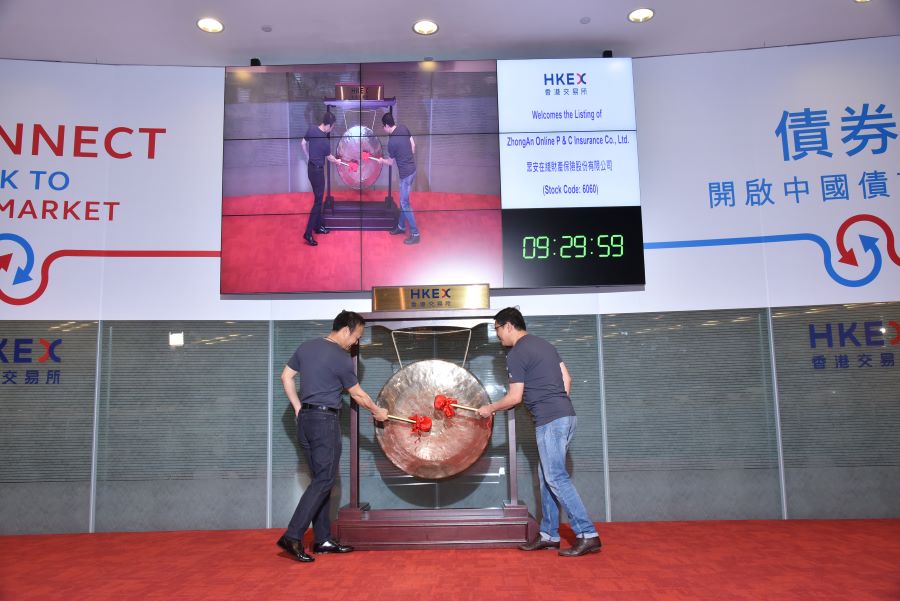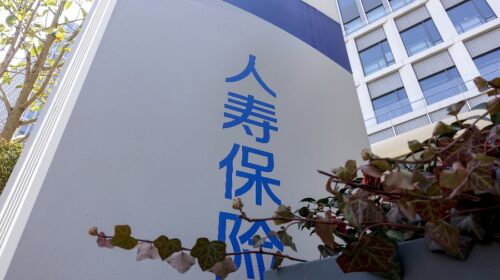ZhongAn’s Big-Tech Ties in Focus as Alibaba-linked Ant Trims Stake

Online insurer’s shares tumbled after Ant Group disclosed plan to trim its longtime stake, but later rebounded after Ant affirmed its commitment to their strategic ties
Key takeaways:
• Ant Group, one of the three founders of ZhongAn, disclosed last week it trimmed its stake in the digital insurer
• ZhongAn has close business ties to the three parents, especially Ant and its Alibaba affiliate under a platform cooperation agreement
By Warren Yang
ZhongAn Online P&C Insurance Co. Ltd.’s (6060.HK) ties to Alibaba (BABA.US; 9988.HK), one of its three big-name parents, have served the online insurer well over the years by acting as a major conduit for new business. But in a country where regulators can quickly make life hard for businesses, Beijing’s growing wariness of expansion by the country’s technology giants into a wide range of sectors means this partnership could be at risk.
ZhongAn, China’s first online-only insurer created in 2013 by Alibaba-affiliated Ant Group, Tencent (0700.HK) and Ping An Insurance (2318.HK; 601318.SS), last week fanned concerns about a potential weakening of its Alibaba ties after Ant revealed it trimmed its stake in the digital insurer to a little more than 10% from about 14%. Following the sale, the three parents each roughly hold 10% of ZhongAn, whose latest market value stood at HK$42 billion ($5.39 billion).
ZhongAn shares tumbled 6% last Tuesday after Ant first revealed its plan to trim its stake in a filing to the Hong Kong Stock Exchange. The stock has since recovered, likely helped by Ant’s separate statement to media saying the transaction stemmed from a “normal course investment decision” and the strategic relationship with ZhongAn “will continue.”
Ant’s reduction of its ZhongAn investment comes as Chinese regulators seek to stop big private enterprises like Alibaba and Tencent from growing too powerful. Ant, in particular, should know the perils of messing with the government, after Beijing forced the company to halt its massive $34 billion IPO in Shanghai and Hong Kong at the last minute in late 2020.
That ambush not only dealt a big blow to Jack Ma, the celebrity founder of Alibaba and Ant’s controlling shareholder, but also kicked off a broader crackdown on private businesses that the government perceives as too powerful. Alibaba has hardly been alone in attracting Beijing’s wrath, with Tencent and other Chinese tech giants also becoming targets of regulatory actions.
Ant’s ZhongAn share sale is just the latest chapter in an ongoing story reflecting its recent woes. Just last Thursday, China’s official Xinhua news agency published a communiqué from the Communist Party’s discipline agency saying authorities must “show no mercy” in rooting out corruption linked to the “disorderly expansion of capital.” The verbal salvo followed the airing of a program on state TV the day before that implied Ant’s involvement in a corruption scandal.
As part of the campaign to keep big businesses in check, the government is pressuring Alibaba, as well as Tencent, to shrink by divesting assets, especially outside their core areas. Ant reduced its stake in Zomato, an Indian food delivery company, last year, while Alibaba is reportedly in talks to sell its stake in Weibo (WB.US; 9898.HK), the Chinese equivalent of Twitter. Tencent, meantime, recently sold most of its stake in JD.com Inc. (JD.US), the second largest online retailer in China, and trimmed its interest in Sea, the largest internet company in Southeast Asia.
Synergistic relationship
ZhongAn’s ties with its big-name parents are not just financial but also synergistic. Its flagship product is insurance to cover costs for returning goods sold on Taobao, Alibaba’s online shopping service. ZhongAn also relies heavily on Alibaba platforms to sell its products under a cooperation agreement. It uses Tencent networks in a similar way, but to a much lesser degree. Ping An provides ZhongAn with asset management services, and the pair have also jointly developed an auto insurance scheme.
Regulatory scrutiny aside, the business collaborations are a bit of a double-edged sword for ZhongAn. Although using its parents’ resources helps ZhongAn generate sales, it also adds to costs. In the first half of last year, fees paid by ZhongAn to Alibaba and its affiliates for use of their platforms amounted to 7% of gross written premiums, the equivalent of top-line revenue for insurers.
Its dependence on third-party platforms has made it difficult for ZhonogAn to turn a profit from writing insurance policies, which it only achieved for the first time in the first half of last year despite growing rapidly since its inception.
So, for its longer-term profitability, it makes sense for ZhongAn to reduce its reliance on services from other companies, including Alibaba. But a complete break with its parents, which in theory could occur if they fully sell their ZhongAn stakes, wouldn’t be so desirable either because they could quickly turn into direct competitors.
Now that ZhongAn has shown how lucrative online insurance can be, Ping An will continue to try to beef up its own efforts in that space. Alibaba also operates an online insurance brokerage platform called Antsure through Ant, while Tencent has a similarly named affiliate called Wesure. Those businesses attract huge traffic thanks to the dominance of their parents. As middleman brokers Antsure and Wesure don’t compete with ZhongAn, which offers its own insurance policies. And ZhongAn would probably prefer to keep it that way.
Investors appear to believe that it’s business as usual for ZhongAn for now, given the quick recovery of the company’s stock after last week’s initial selloff.
ZhongAn shares have lost more than half of their value since their market debut in 2017 as they, like other Chinese fintech stocks, have borne the brunt of the regulatory crackdown on their sector. But ZhongAn’s stock still commands a price-to-earnings (P/E) ratio of more than 40. Among other online insurance businesses, broker Waterdrop Inc. (NYSE: WDH) isn’t profitable yet and isn’t expected to stop losing money anytime soon, meaning it has no P/E. Turning to another metric, ZhongAn also trumps Waterdrop in terms of its price-to-sale (P/S) ratio of 1.8 based on 2020 revenue, compared to Waterdrop’s multiple that barely surpasses 1.
Yet it’s hard to predict how much further Chinese regulators will go to rein in big tech to contain its dominance. That means it’s hard to rule out the possibility that Alibaba and Tencent might be forced to sell all their ZhongAh shares. To shield from this risk, the best way forward for ZhongAn is to keep its head down and continue working to wean itself from its big tech parents.
To subscribe to Bamboo Works free weekly newsletter, click here






